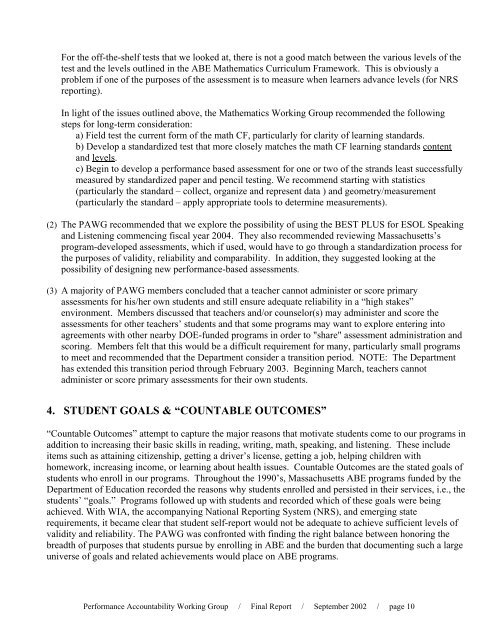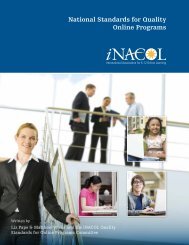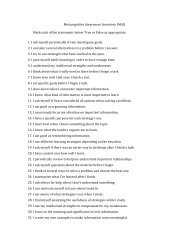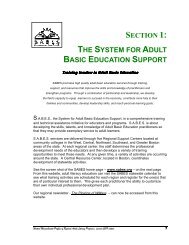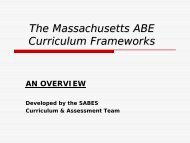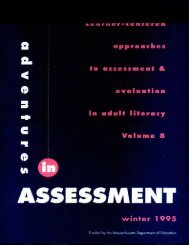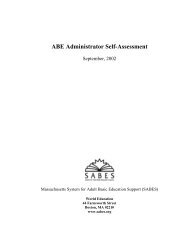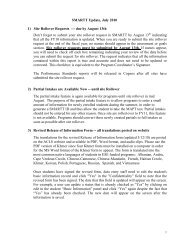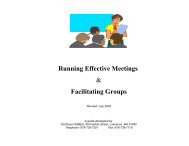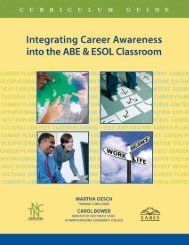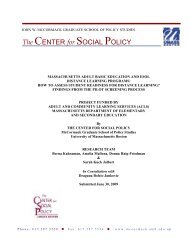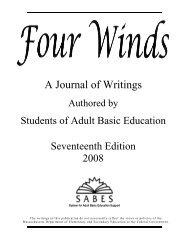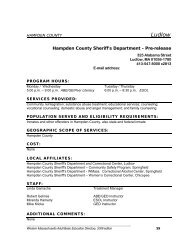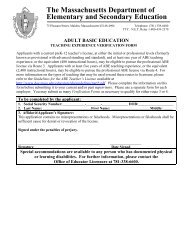PAWG I Final Report - SABES
PAWG I Final Report - SABES
PAWG I Final Report - SABES
Create successful ePaper yourself
Turn your PDF publications into a flip-book with our unique Google optimized e-Paper software.
For the off-the-shelf tests that we looked at, there is not a good match between the various levels of the<br />
test and the levels outlined in the ABE Mathematics Curriculum Framework. This is obviously a<br />
problem if one of the purposes of the assessment is to measure when learners advance levels (for NRS<br />
reporting).<br />
In light of the issues outlined above, the Mathematics Working Group recommended the following<br />
steps for long-term consideration:<br />
a) Field test the current form of the math CF, particularly for clarity of learning standards.<br />
b) Develop a standardized test that more closely matches the math CF learning standards content<br />
and levels.<br />
c) Begin to develop a performance based assessment for one or two of the strands least successfully<br />
measured by standardized paper and pencil testing. We recommend starting with statistics<br />
(particularly the standard – collect, organize and represent data ) and geometry/measurement<br />
(particularly the standard – apply appropriate tools to determine measurements).<br />
(2) The <strong>PAWG</strong> recommended that we explore the possibility of using the BEST PLUS for ESOL Speaking<br />
and Listening commencing fiscal year 2004. They also recommended reviewing Massachusetts’s<br />
program-developed assessments, which if used, would have to go through a standardization process for<br />
the purposes of validity, reliability and comparability. In addition, they suggested looking at the<br />
possibility of designing new performance-based assessments.<br />
(3) A majority of <strong>PAWG</strong> members concluded that a teacher cannot administer or score primary<br />
assessments for his/her own students and still ensure adequate reliability in a “high stakes”<br />
environment. Members discussed that teachers and/or counselor(s) may administer and score the<br />
assessments for other teachers’ students and that some programs may want to explore entering into<br />
agreements with other nearby DOE-funded programs in order to "share" assessment administration and<br />
scoring. Members felt that this would be a difficult requirement for many, particularly small programs<br />
to meet and recommended that the Department consider a transition period. NOTE: The Department<br />
has extended this transition period through February 2003. Beginning March, teachers cannot<br />
administer or score primary assessments for their own students.<br />
4. STUDENT GOALS & “COUNTABLE OUTCOMES”<br />
“Countable Outcomes” attempt to capture the major reasons that motivate students come to our programs in<br />
addition to increasing their basic skills in reading, writing, math, speaking, and listening. These include<br />
items such as attaining citizenship, getting a driver’s license, getting a job, helping children with<br />
homework, increasing income, or learning about health issues. Countable Outcomes are the stated goals of<br />
students who enroll in our programs. Throughout the 1990’s, Massachusetts ABE programs funded by the<br />
Department of Education recorded the reasons why students enrolled and persisted in their services, i.e., the<br />
students’ “goals.” Programs followed up with students and recorded which of these goals were being<br />
achieved. With WIA, the accompanying National <strong>Report</strong>ing System (NRS), and emerging state<br />
requirements, it became clear that student self-report would not be adequate to achieve sufficient levels of<br />
validity and reliability. The <strong>PAWG</strong> was confronted with finding the right balance between honoring the<br />
breadth of purposes that students pursue by enrolling in ABE and the burden that documenting such a large<br />
universe of goals and related achievements would place on ABE programs.<br />
Performance Accountability Working Group / <strong>Final</strong> <strong>Report</strong> / September 2002 / page 10


